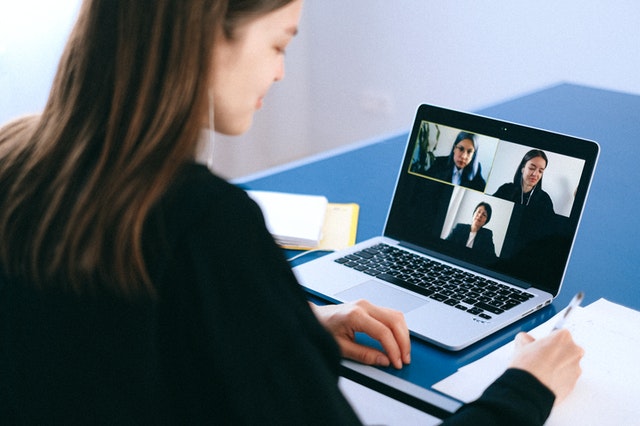The COVID-19 pandemic forced us to develop new forms of collaboration and delivering support services. A major shift was to move support services, i.e. coaching and mentoring, from in-person meetings to online meetings. In the beginning there was an enthusiasm about the new technology, think Zoom and Teams meetings, some of us might have felt some relieve to avoid the commute to work. However, after a couple of weeks the pandemic had a negative effect on the Subjective Well Being (Berill et al., 2020), resilience (Yue and Cowling, 2021) and a feeling of losing control (Jarosz, 2021)emerged. Additionally, limited space, shaky internet connections and limited data volume made remote collaboration and support more challenging. Making use of virtual collaboration tools, we had to invite our beneficiaries into our living rooms or our kitchen. Distractions and interruptions from kids, cats, dogs and partners became normal.
There is evidence (de Haan, 2008; Megginson and Clutterbuck 2005, 2009; Garvey and Stokes, 2022) that the working alliance between coach and coachee/mentor and mentee contributes significantly to the outcome of the intervention. Effective relationships between the dyads are based on trust and rapport. Psychological safety (Kline, 1999) and empathy (Garvey and Stokes, 2022) are essential for effective coaching or mentoring. When the pandemic arrived in Europe we developed a remote mentoring programme. During the design phase we all knew and communicated openly that we did not have the answer or would be able to predict the effectiveness of the programme. It is fair to say, that we were in good company – no one knew when it all would end or what a new reality might look like. Waiting or not doing something felt worse. Beneficiaries asked explicitly for mentoring (and coaching) services. They were looking for someone who would be at their side and help them with their thinking. We based the mentoring programme on two assumptions:
- The focus has to be on the relationship. The working alliance is based on trust and rapport. The ambition is to create a space of psychological safety.
- We do not have the answer. A coach/mentor will be at the coachee’s/mentee’s side. Together we will explore opportunities.
These two assumptions shaped how we prepared mentors for their role. Processes and techniques support creating time and space for the mentees to talk openly about their concerns, ideas and invite to experiment and reach out to others rather. Quite naturally mentors found it difficult to admit not knowing and not having an answer. However, this attitude and openness created an atmosphere of authenticity and openness which enabled the mentees to explore new routes and potential opportunities. The mentee’s agenda always had priority and it was the mentee who drove the agenda and by that took responsibility for their professional and personal life.
The objective of the SOS Mentoring (or coaching) assignment was:
- To deal with the stress and negative emotions, i.e. social distancing, uncertainty, fear of losing control, financial worries,
- Allow for creativity and experimentation,
- Put the mentee’s agenda at the forefront of everything,
- Create an atmosphere of psychological safety,
- Establish trust and rapport between mentor and mentee,
- Make use of technology to connect,
- Enable mentees/coachees to become their own agent of change and development.
In Spain some 1.109 entrepreneurs who were affected by the pandemic have received support through mentors remotely. 1.048 entrepreneurs were still trading after the intervention ended. Despite (or because of) our initial doubts we would argue that remote interventions can be as effective as support programmes delivered in 1-on-1 or group settings. It is critical to establish an effective working alliance from the outset. The well-being and agenda of the beneficiary should be addressed in each session.
- Exploring the mentee’s means and resources which are readily available to them
- Explores new opportunities collaborating with others and by that helps to build-up external support
- Take action
- Encourage to explore and develop new ideas and solutions in collaboration with customers and partners
The described approach seems to work online as well as offline. Garvey and Stokes (2022) demonstrate that online coaching and mentoring can be as effective as offline interventions. There are, however, conditions which need to be met. We suggest to ensure that beneficiaries have access to sufficient data volume and technology to participate. This is still an unsolved issue in underserved communities and has to be addressed adequately to avoid exclusion of the most vulnerable target audience. Mentors and coaches need to be prepared for their role in an online setting. Assuming that, based on their experience or a direct translation of offline formats to online formats will very likely not deliver the intended results, i.e. social inclusion, access to the labour market.
References:
Berrill, J., Cassells, D., O’Hagan-Luff, M., Stel, A. v. (2020) “The Relationship between Financial Distress and Well-Being: Exploring the Role of Self-Employment,” International Small Business Journal:Researching Entrepreneurship,Vol. 39(4) 330–349. doi: 10.1177/0266242620965384.
Garvey, B. and Stokes, P. (2022) Coaching and mentoring : theory and practice.4th edition. London: SAGE.
Haan, E. de (2008) Relational coaching: journeys towards mastering one-to-one learning.Chichester: John Wiley.
Jarosz, J. (2021) “The Impact of Coaching on Well-Being And Performance of Managers and Their Teams during Pandemic,” International Journal of Evidence Based Coaching and Mentoring,19(1), pp. 4–27. doi: 10.24384/n5ht-2722.
Kline, N. (1999) Time to think: listening to ignite the human mind.London: Ward Lock.
Megginson, D. and Clutterbuck, D. (2005) Techniques for Coaching and Mentoring.Oxford: Elsevier Butterworth-Heinemann
Megginson, D. and Clutterbuck, D. (2009) Further techniques for coaching and mentoring. 1st edn. Amsterdam: Butterworth-Heinemann.
Yue, W. and Cowling, M. (2021) “The Covid-19 Lockdown in the United Kingdom and Subjective Well-Being: Have the Self-Employed Suffered More Due to Hours and Income Reductions?,” International Small Business Journal,39(2), pp. 93–108. doi: 10.1177/0266242620986763.
Jörg Schoolmann, KIZ SINNOVA, Germany; Jo Gray, YBI, UK ; Guillem Aris, Autoocupacio, Spain


